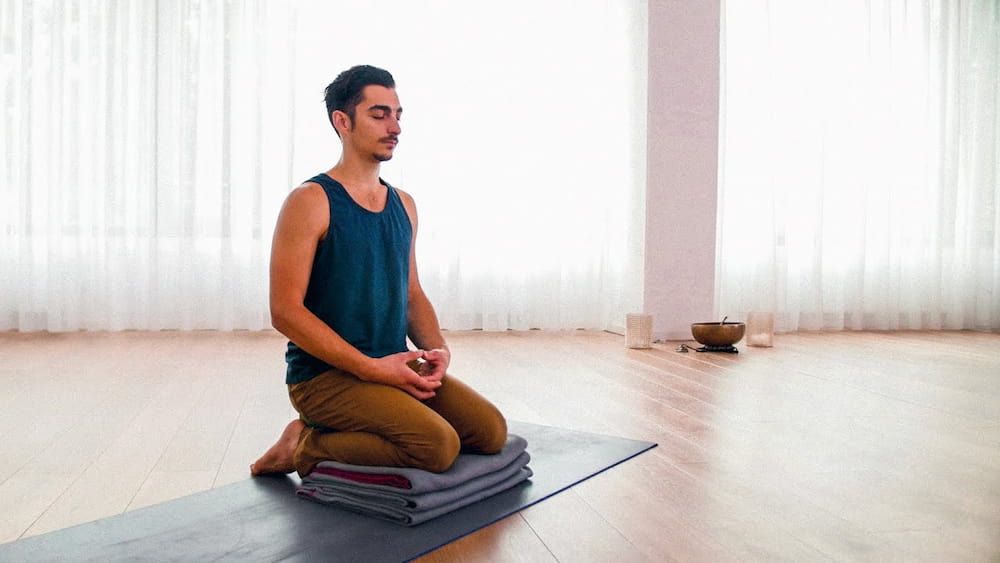How Often Should You Meditate? Top Benefits
In the West, meditation has grown in popularity, but many still associate it with negative connotations. From as little as five minutes a day, you can incorporate meditation into your daily life. Although there is little preparation needed for a single mindfulness meditation session, regular practice is crucial. More is better when deciding how often to meditate, but it’s not as easy as that.
How often should you meditate? Your attention has the power to strengthen what you are focusing on while weakening what you are diverting it from.Therefore, the best results will come from a regular daily meditation practice. One must dedicate themselves to practice, practice, practice—every day—in order to hone any kind of skill set. In order to achieve your goals, you must act each day. To maintain the desired results in your health and fitness, you must regularly get up and move, take care of your diet, and wind down for restful sleep. There is little chance that you will succeed in what you want to do if you don’t focus your intention and attention on it. Crisis meditation, in other words, is ineffective.
In this article, we’ll explore the question “how often should you meditate?” and we’ll also take a closer look at what you can expect to gain from frequent meditation and how it can bring benefits to your mental and physical health.
Table of Contents
What Is Meditation?
Meditation is a practice that has been practiced in one form or another for thousands of years by many different religions and spiritual traditions around the world. In many places, the practice is intended to bring about self-actualization through experiencing altered states of consciousness, thus arriving at a knowingness that the world you believe to be real is maya—a mere illusion. The Vedanta teachings direct you to be still and know that you are God—to see and experience yourself as nothing more than a drop in the ocean of consciousness and to experience yourself as an individuated expression of God.
The method has been simplified and made more accessible in more recent times with the aim of calming the mind, calming the emotions, and minimizing the negative effects of stress. It has less to do with chanting up the sun for years in an ashram or sitting at the guru’s feet. While science has shown the tangible advantages of regularly sitting in silence and stillness, not everyone in modern society is interested in adopting the practices of the ancient cultures. Supporting this, you can see meditation centers popping up in resorts, on street corners, and even in airports worldwide, giving the everyday modern seeker the opportunity to duck inside and take some much-needed “time in.”
How Often Should You Meditate?
In that we are honing a skill, meditation is comparable to physical exercise. We become more adept at using the skill the more we use it. It’s best to meditate every day if you can because of this. You won’t feel sore afterwards, unlike with exercise, so there is no need for days off. Having said that, if you’re not able to meditate daily it’s important to be gentle with yourself and not beat yourself up for having “inadequate discipline.”
When we make a commitment to practicing meditation regularly, whether that means daily or less frequently, it will be most effective. (once more, like working out!) We can become more intimately familiar with our minds when we maintain that regularity for extended periods of time.

Why Meditate Often?
Many people find that meditation enables them to spend some time alone, unburdened by the pressures of the outside world. It’s very simple to get caught up in the rat race in this day and age and forget about our own needs. A few minutes of meditation each day can make a big difference in combating this.
You can meditate anywhere, as you probably already know. sitting at your desk at work? No issue. In your garden? In the train, of course. Without a doubt, if it’s that easy to implement, we can do so with little to no disruption to our daily lives. All you need is good meditation posture and a place where you can be undisturbed for a few minutes.
If you find it challenging to think about meditating, it’s important to know that you can fit it into your schedule for as little as five minutes each day. Finding the best meditation teachers frequently affects how frequently you meditate. It’s likely that you won’t enjoy meditation if someone’s voice bothers you or if something feels right. Fortunately, there are many meditation teachers out there; you just need to find the meditation method that feels comfortable for you in order to regularly enjoy your meditation sessions.
What Are Your Objectives In Practicing Meditation?
It’s crucial to be conscious of your expectations when starting your meditation journey. The benefits of meditation should be considered first before determining how frequently you should practice it. The purpose of meditation all comes down to want you’re looking to get from it.
For example, you are looking to relieve stress, and in this instance, you may decide to practice when you find yourself in a stressful situation. And it might be successful. Your stress levels can physically decrease if you take a few minutes to close your eyes, collect your thoughts, and do some deep breathing. But you’ll need to practice more frequently and intensely if you’re hoping for something more spiritually awakening.
You will find it simple to create a meditation schedule once your personal objectives and needs have been identified. Having said that, even a short amount of time each day will help you develop a strong practice.
Enjoy Yourself
People frequently start a meditation practice because they believe it to be fashionable or because their friends are doing it, which can result in inconsistent and ineffective practice.
It should be a very personal and individual experience for you to meditate. We will both benefit in different ways from meditation, as how I meditate and how you meditate will differ. It doesn’t necessarily follow that a technique will be effective for everyone just because yoga guru Tina suggested it. It is essential that you find a meditation practice that suits you and that you enjoy when you meditate. Explore different methods and try out some guided meditations to see what ignites your passion.
You can live in the present moment and get rid of bad moods by practicing meditation. You can therefore truly just relax and have fun while meditating. You can enhance your general well-being by incorporating it into your daily schedule.

How To Fit A Daily Practice Into Your Life?
We’ll look into these later in more detail, but research has shown that daily meditation has a wealth of advantages. But how are we supposed to fit in a daily meditation on top of everything else with our hectic schedules? It might not be as challenging as you might believe. The best time to meditate is the time that best works for you.
First and foremost, if you don’t want to meditate every day, you won’t. Setting up your daily practice requires commitment, which is crucial. But there are actionable things you can take to boost your confidence in your ability to fulfill this commitment.
It can be much simpler to fit yoga and meditation into your practice if you combine the two. After your yoga session, spend some time in meditation to start noticing the advantages.
There are many smartphone apps available that can make daily meditation a cinch with a daily meditation app. These apps give users access to a wide variety of guided meditations, soundscapes, and timers in order to not only make meditation accessible but also to give you the necessary resources to get started. Try our app, Declutter The Mind!
It can be much easier to stick to a routine for people who are extremely busy when meditation is included at the beginning and end of the day. Why not try scheduling a meditation session before you get out from under the covers or before going to sleep at night? It is entirely possible to practice meditation from the comfort of your bed.
Everyone must eat, so taking a moment to meditate during meals is a great way to ensure that your daily practice doesn’t suffer. You can choose to do it before or after eating, but this is a guaranteed way to remember to do it. Even practicing while eating is possible with mindful eating.
Above all, try not to be too hard on yourself if you miss a day. Not a chore, meditation should be enjoyable. You might need to try a few different things before you find the one that works best for your daily routine because everyone is different.
The Benefits Of Meditating More Often
Since more people are becoming aware of meditation, medical professionals are even recommending it to patients who struggle with mental health issues like depression and anxiety. Many studies have proven it can be of use for these issues, plus many other scientific benefits of meditation.
Whether you can only manage five minutes or five hours a day, starting a daily meditation practice can have a big impact on your life.
Helps Control Behavior
You might also experience an uptick in happiness and altruism toward others. Your behavior will show how positively you feel overall as a result of this mindful practice.
Some advice on how to meditate regularly can aid in preventing memory loss as we age.
Even as a beginner, you can arouse feelings of tranquility. Being mindful allows you to live in the present rather than repeating the past or worrying about the future, which can bring about a sense of peace in your life.
Improves Your Ability To Focus And Increase Your Attention Span
By meditating every day, you will develop a much greater sense of self-awareness, which will help you get to know yourself better. You can make better decisions to help others, improve your life, or even learn new skills by increasing your awareness of people, spoken words, and life happening around you.
Helps Regulate Emotional Health
You’ll get better sleep through meditation, which will make you feel more rested.
No prior experience or special equipment is required to begin practicing meditation, which is one of its many noteworthy benefits. Meditation is available to everyone because you can practice it at any location and time of day.
Improves Self Care
Every day meditation is an investment in the self-care of the person who practices it. Spending time each day concentrating on your breath, being in the moment, and avoiding getting sucked into other aspects of your life are the most crucial things to remember. The best parts of you can be brought out through mindfulness practices without making you feel like you’re trying too hard to be the best. So, practice meditation if you’re feeling stressed. It might be exactly what you require.
Add Meditation To Your Daily Life
You naturally want to lead a healthy, happy, fulfilling life. For some people, that entails developing a stronger sense of identity, understanding the purpose of their existence, and discovering what they should be doing with their lives. Regardless of your intentions, the first step in developing self-awareness is getting to know and understand yourself better. Only when you are conscious are you able to change yourself, and only when you are conscious are you able to make decisions that are consistent with who you really are. In other words, some people participate for the spiritual benefits, while others do it purely for relaxation and stress relief. Consistency is essential for achieving any goal that each person has.
Since meditation is a cumulative practice, you should incorporate it into your daily routine on a par with tooth brushing. The best part is that the effects of meditation can be felt right away, which is something that modern people crave: instant gratification. Consider it. If you’ve ever taken some time to yourself to sit, breathe, and simply BE, you already know that you feel calmer, more balanced, and maybe even a little lighter after the experience. You also probably noticed that as you stood back up to resume activity after your time in stillness, you were more aware of yourself and your surroundings. You can consider daily meditation as a chance to step away from the chaos of your everyday life and immerse yourself in a place of silence where everything seems to calm down, even if it only lasts a short while.
The way you would approach each day would change if you spent 20 to 30 minutes in meditation each morning before starting your daily routine. How different life would be for you if you could start every day from that peaceful, grounded place? When you meditate every day, you can relax into yourself, become aware of who you are, and decide how you want to manifest your reality. Everything changes for the better as a result.
At the end of the day, meditation is a technique that both new and experienced spiritual practitioners can benefit from. There are many different approaches and styles of meditation, which is great because you can practice it anywhere without any equipment. See which type of meditation most appeals to you at this point in your life by trying out a few different ones. You might discover that you prefer themed or guided meditations for addressing particular issues, whereas a silent meditation practice may fit into your daily routine and improve your mental health in general. As you try various meditation techniques until you find one that works for you, give yourself permission to be curious. You’ll start to notice how it makes life a little easier to navigate once you make meditation a habit.
I appreciate you reading.





